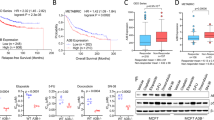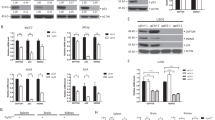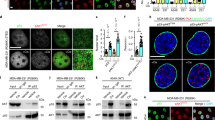Abstract
The PI3-kinase pathway is the target of inactivation in achieving better cancer chemotherapy. Here, we report that p53-mediated transcription is inhibited by pharmacological inhibitors and a dominant-negative mutant of PI3-kinase, and this inhibition was relieved by a constitutively active mutant of PI3-kinase. Akt/PKB and mTOR, the downstream effectors of PI3-kinase, were also found to be essential. LY294002 (PI3-kinase inhibitor) pre-treatment altered the post-translational modifications and the sub-cellular localization of p53. Although LY294002 increased the chemosensitivity of cells to low concentrations of adriamycin (adriamycin-low), it protected the cells from cytotoxicity induced by high concentrations of adriamycin (adriamycin-high) in a p53-dependent manner. Further, we found that LY294002 completely abolished the activation of p53 target genes (particularly pro-apoptotic) under adriamycin-high conditions, whereas it only marginally repressed the p53 target genes under adriamycin-low conditions; in fact, it further activated the transcription of NOXA, HRK, APAF1 and CASP5 genes. Thus, the differential effect of PI3-kinase on p53 functions seems to be responsible for the differential regulation of DNA damage-induced cytotoxicity and cell death by PI3-kinase. Our finding becomes relevant in the light of ongoing combination chemotherapy trials with the PI3-kinase pathway inhibitors and underscores the importance of p53 status in the careful formulation of combination chemotherapies.
This is a preview of subscription content, access via your institution
Access options
Subscribe to this journal
Receive 50 print issues and online access
$259.00 per year
only $5.18 per issue
Buy this article
- Purchase on Springer Link
- Instant access to full article PDF
Prices may be subject to local taxes which are calculated during checkout








Similar content being viewed by others
Abbreviations
- PI3-kinase:
-
phosphoinositide 3-kinase
- PKB/Akt:
-
protein kinase B/Akt
- mTOR:
-
mammalian target of rapamycin
References
Bar J, Lukaschuk N, Zalcenstein A, Wilder S, Seger R, Oren M . (2005). The PI3K inhibitor LY294002 prevents p53 induction by DNA damage and attenuates chemotherapy-induced apoptosis. Cell Death Differ 12: 1578–1587.
Das S, El-Deiry WS, Somasundaram K . (2003). Regulation of the p53 homolog p73 by adenoviral oncogene E1A. J Biol Chem 278: 18313–18320.
el-Deiry WS, Tokino T, Velculescu VE, Levy DB, Parsons R, Trent JM et al. (1993). WAF1, a potential mediator of p53 tumor suppression. Cell 75: 817–825.
Engelman JA . (2009). Targeting PI3K signalling in cancer: opportunities, challenges and limitations. Nat Rev Cancer 9: 550–562.
Fujiwara Y, Kawada K, Takano D, Tanimura S, Ozaki K, Kohno M . (2006). Inhibition of the PI3 kinase/Akt pathway enhances doxorubicin-induced apoptotic cell death in tumor cells in a p53-dependent manner. Biochem Biophys Res Commun 340: 560–566.
Gottlieb TM, Leal JF, Seger R, Taya Y, Oren M . (2002). Cross-talk between Akt, p53 and Mdm2: possible implications for the regulation of apoptosis. Oncogene 21: 1299–1303.
Guillard S, Clarke PA, Te Poele R, Mohri Z, Bjerke L, Valenti M et al. (2009). Molecular pharmacology of phosphatidylinositol 3-kinase inhibition in human glioma. Cell Cycle 8: 443–453.
Hennessy BT, Smith DL, Ram PT, Lu Y, Mills GB . (2005). Exploiting the PI3K/AKT pathway for cancer drug discovery. Nat Rev Drug Discov 4: 988–1004.
Huang WC, Chen CC . (2005). Akt phosphorylation of p300 at Ser-1834 is essential for its histone acetyltransferase and transcriptional activity. Mol Cell Biol 25: 6592–6602.
Johnstone RW, Ruefli AA, Lowe SW . (2002). Apoptosis: a link between cancer genetics and chemotherapy. Cell 108: 153–164.
Kemler I, Schreiber E, Muller MM, Matthias P, Schaffner W . (1989). Octamer transcription factors bind to two different sequence motifs of the immunoglobulin heavy chain promoter. EMBO J 8: 2001–2008.
Kruse JP, Gu W . (2009). Modes of p53 regulation. Cell 137: 609–622.
Lacroix M, Toillon RA, Leclercq G . (2006). p53 and breast cancer, an update. Endocr Relat Cancer 13: 293–325.
Lee CH, Inoki K, Karbowniczek M, Petroulakis E, Sonenberg N, Henske EP et al. (2007). Constitutive mTOR activation in TSC mutants sensitizes cells to energy starvation and genomic damage via p53. EMBO J 26: 4812–4823.
Levine AJ, Feng Z, Mak TW, You H, Jin S . (2006). Coordination and communication between the p53 and IGF-1-AKT-TOR signal transduction pathways. Genes Dev 20: 267–275.
Levine AJ, Oren M . (2009). The first 30 years of p53: growing ever more complex. Nat Rev Cancer 9: 749–758.
Li X, Lu Y, Liang K, Liu B, Fan Z . (2005). Differential responses to doxorubicin-induced phosphorylation and activation of Akt in human breast cancer cells. Breast Cancer Res 7: R589–R597.
LoPiccolo J, Blumenthal GM, Bernstein WB, Dennis PA . (2008). Targeting the PI3K/Akt/mTOR pathway: effective combinations and clinical considerations. Drug Resist Updat 11: 32–50.
Lowe SW, Bodis S, McClatchey A, Remington L, Ruley HE, Fisher DE et al. (1994). p53 status and the efficacy of cancer therapy in vivo. Science 266: 807–810.
Mayo LD, Donner DB . (2001). A phosphatidylinositol 3-kinase/Akt pathway promotes translocation of Mdm2 from the cytoplasm to the nucleus. Proc Natl Acad Sci USA 98: 11598–11603.
Meek DW . (1997). Post-translational modification of p53 and the integration of stress signals. Pathol Biol (Paris) 45: 804–814.
Meek DW . (2004). The p53 response to DNA damage. DNA Repair (Amst) 3: 1049–1056.
Min YH, Eom JI, Cheong JW, Maeng HO, Kim JY, Jeung HK et al. (2003). Constitutive phosphorylation of Akt/PKB protein in acute myeloid leukemia: its significance as a prognostic variable. Leukemia 17: 995–997.
Mungamuri SK, Yang X, Thor AD, Somasundaram K . (2006). Survival signaling by Notch1: mammalian target of rapamycin (mTOR)-dependent inhibition of p53. Cancer Res 66: 4715–4724.
Ogawara Y, Kishishita S, Obata T, Isazawa Y, Suzuki T, Tanaka K et al. (2002). Akt enhances Mdm2-mediated ubiquitination and degradation of p53. J Biol Chem 277: 21843–21850.
Price BD, Youmell MB . (1996). The phosphatidylinositol 3-kinase inhibitor wortmannin sensitizes murine fibroblasts and human tumor cells to radiation and blocks induction of p53 following DNA damage. Cancer Res 56: 246–250.
Ramaswamy S, Nakamura N, Vazquez F, Batt DB, Perera S, Roberts TM et al. (1999). Regulation of G1 progression by the PTEN tumor suppressor protein is linked to inhibition of the phosphatidylinositol 3-kinase/Akt pathway. Proc Natl Acad Sci USA 96: 2110–2115.
Reddy SP, Britto R, Vinnakota K, Aparna H, Sreepathi HK, Thota B et al. (2008). Novel glioblastoma markers with diagnostic and prognostic value identified through transcriptome analysis. Clin Cancer Res 14: 2978–2987.
Reif K, Nobes CD, Thomas G, Hall A, Cantrell DA . (1996). Phosphatidylinositol 3-kinase signals activate a selective subset of Rac/Rho-dependent effector pathways. Curr Biol 6: 1445–1455.
Sakai A, Thieblemont C, Wellmann A, Jaffe ES, Raffeld M . (1998). PTEN gene alterations in lymphoid neoplasms. Blood 92: 3410–3415.
Somasundaram K . (2000). Tumor suppressor p53: regulation and function. Front Biosci 5: D424–D437.
Somasundaram K, El-Deiry WS . (1997). Inhibition of p53-mediated transactivation and cell cycle arrest by E1A through its p300/CBP-interacting region. Oncogene 14: 1047–1057.
Vivanco I, Sawyers CL . (2002). The phosphatidylinositol 3-kinase AKT pathway in human cancer. Nat Rev Cancer 2: 489–501.
Vousden KH . (2006). Outcomes of p53 activation—spoilt for choice. J Cell Sci 119: 5015–5020.
Vousden KH, Prives C . (2009). Blinded by the light: the growing complexity of p53. Cell 137: 413–431.
Wendel HG, De Stanchina E, Fridman JS, Malina A, Ray S, Kogan S et al. (2004). Survival signalling by Akt and eIF4E in oncogenesis and cancer therapy. Nature 428: 332–337.
Zhou BP, Liao Y, Xia W, Zou Y, Spohn B, Hung MC . (2001). HER-2/neu induces p53 ubiquitination via Akt-mediated MDM2 phosphorylation. Nat Cell Biol 3: 973–982.
Acknowledgements
KS is a Wellcome Trust International Senior Research Fellow. Infrastructural support by funding from ICMR, DBT, DST and UGC to MCB is acknowledged. RS gratefully acknowledges SRF from CSIR.
Author information
Authors and Affiliations
Corresponding author
Ethics declarations
Competing interests
The authors declare no conflict of interest.
Additional information
Supplementary Information accompanies the paper on the Oncogene website
Supplementary information
Rights and permissions
About this article
Cite this article
Suvasini, R., Somasundaram, K. Essential role of PI3-kinase pathway in p53-mediated transcription: Implications in cancer chemotherapy. Oncogene 29, 3605–3618 (2010). https://doi.org/10.1038/onc.2010.123
Received:
Revised:
Accepted:
Published:
Issue Date:
DOI: https://doi.org/10.1038/onc.2010.123
Keywords
This article is cited by
-
A cytosolic mutp53(E285K) variant confers chemoresistance of malignant melanoma
Cell Death & Disease (2023)
-
A novel role of vitronectin in promoting survival of mesenchymal stem cells under serum deprivation stress
Stem Cell Research & Therapy (2020)
-
Stem cell death and survival in heart regeneration and repair
Apoptosis (2016)
-
Expression of pAkt affects p53 codon 72 polymorphism-based prediction of response to radiotherapy in nasopharyngeal carcinoma
Radiation Oncology (2013)
-
Daunorubicin induces cell death via activation of apoptotic signalling pathway and inactivation of survival pathway in muscle-derived stem cells
Cell Biology and Toxicology (2012)



